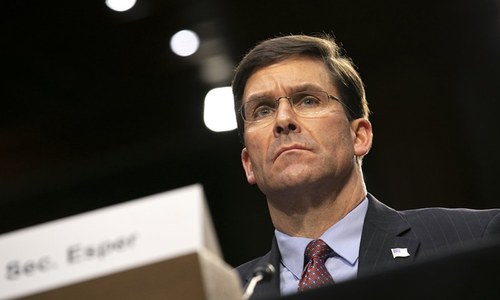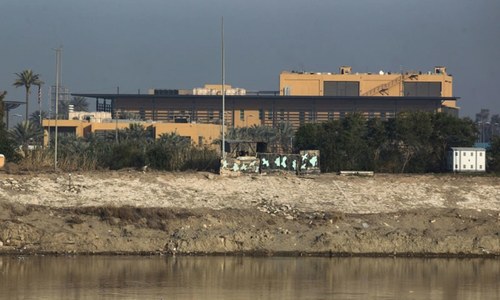
BAGHDAD: A barrage of rockets hit a base housing US and other coalition troops north of Baghdad on Saturday, Iraqi security officials said, just days after a similar attack killed three servicemen, including two Americans.
The US-led coalition said at least 25 107mm rockets struck Camp Taji just before 11am. Some struck the area where coalition forces are based, while others fell on air defense units, the Iraqi military statement said.
Five coalition members and two Iraqi soldiers were wounded in the attack at Camp Taji, according to spokesman for the US-led coalition Myles Caggins. The nationalities of the wounded coalition members was not immediately known.
A statement from Iraq’s military said the brutal aggression wounded a number of air defense personnel who remain in critical condition, but did not provide a number.
Iraqi forces later discovered seven platforms from which the rockets were in the Abu Azam area, north of Baghdad. Another 24 missiles were discovered in place and ready to launch.
The attack was unusual because it occurred during the day. Previous assaults on military bases housing US troops typically occurred at night.
The earlier rocket attack against Camp Taji on Wednesday also killed a British serviceman. It prompted American airstrikes Friday against what US officials said were mainly weapons facilities belonging to Kataib Hezbollah, the Iran-backed militia group believed to be responsible.
However, Iraq’s military said those airstrikes killed five security force members and a civilian, while wounding five fighters from the Popular Mobilisation Forces, an umbrella organisation including an array of militias, including some Iran-backed groups.
Iran-backed militia groups vowed to exact revenge for Friday’s US strikes, signalling another cycle of tit-for-tat violence between Washington and Tehran that could play out inside Iraq.
Iraq’s military also cautioned the US from taking retaliating as it did on Friday without taking approval from the government. Taking unilateral action would “not limit these actions, but rather nurtures them, weakens the ability of the Iraqi state, the statement said.
America’s killing of Iraqi security forces might also give Iran-backed militia groups more reason to stage counterattacks against US troops in Iraq, analysts said.
We cant forget that the PMF is a recognised entity within the Iraqi security forces; they aren’t isolated from the security forces and often are co-located on the same bases or use the same facilities, said Sajad Jiyad, a researcher and former managing director of the Bayan Center, a Baghdad-based think tank.
Now the (Iran-backed) groups who supported the initial strike in Taji, who were the most outspoken, feel obliged, authorised, maybe even legitimised to respond, ostensibly to protect Iraqi sovereignty but really to keep the pressure up on Americans, he added. There are no red lines anymore,” Jiyad said.
Wednesday’s attack on Camp Taji was the deadliest to target US troops in Iraq since a late December rocket attack on an Iraqi base, which killed a US contractor. That attack set in motion a series of attacks that brought Iraq to the brink of war.
After the contractor was killed, America launched air strikes targeting Kataib Hezbollah, which in turn led to protests at the US Embassy in Baghdad.
A US drone strike in Baghdad then killed Iranian Gen. Qassem Soleimani, a top commander responsible for expeditionary operations across the wider Mideast.
Iran struck back with a ballistic missile attack on US forces in Iraq, the Islamic Republics most direct assault on America since the 1979 seizing of the US Embassy in Tehran.
The US and Iran stepped back from further attacks after the Soleimani incident. A senior US official said in late January, when US-Iran tensions had cooled, that the killing of Americans constituted a red line that could spark more violence.
Published in Dawn, March 15th, 2020














































